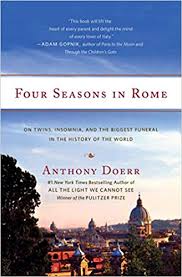Four Seasons in Rome: On Twins, Insomnia, and the Biggest Funeral in the History of the World
By Anthony Doerr
Anthony Doerr is the author of the 2014 novel All the Light We Cannot See, which won a Pulitzer Prize in 2015 and was a New York Times bestseller. While he was writing that novel, he was offered a fellowship in literature by the American Academy. That offer included an apartment in Rome for a year, a small office in the Academy building, and a monthly stipend of $1,300 to continue writing his novel, his third book. But Doerr and his wife had just become the proud parents of twin boys, now just six months old. The challenge of moving from Boise, Idaho, to Rome (requiring a 14-hour plane trip) and living there for an entire year became an effort requiring near military planning and precision. And neither Doerr nor his wife could speak Italian.
If any of you have read Doerr’s novel, have traveled to Rome or hope to, or have traveled with very young children or grandchildren, especially twins, you will undoubtedly enjoy this account. At only 210 pages in the paperback version, Doerr manages to make Rome come alive through his visitor’s eyes. And at the same time, he takes us on a travelog of his adventures in a foreign country, managing to communicate with very little Italian but with two adorable twins to help break the language barrier. And all the time, in the background, we realize he is writing his highly acclaimed novel about World War II.
Doerr and his wife, Shauna, manage two infant boys waking at different times for middle-of-the-night feedings, finding their way around Rome with a double stroller and without a car, hiring an English-speaking babysitter, and discovering the history, beauty and magnificence of a city more than a couple thousand years old. Finding and purchasing everyday items for their babies and for themselves is sometimes frustrating and sometimes hilarious. There is even a sighting of the Pope. And a trip to the hospital, almost always frightening, is doubly so in a foreign country where communication is an obstacle.
Doerr’s descriptions are sometimes full of color and sometimes absolutely luminous at certain times of day in Rome. He marvels at the age of the monuments, art, and architecture he sees every day and often explains their historical significance. The recounting of his linguistic mistakes and the resulting confusion are priceless. He writes beautiful descriptions of the birds, flowers, trees, and especially the light – all this living side by side with unruly traffic, modern shops, and utterly delicious food.
I read the paperback version of this book a few months ago and just recently listened to the audio version, which I was happy to find was read by the author. This book is rated 3.9 stars on Goodreads, and I was happy to give it four stars myself. It’s an excellent and sometimes delightful short read, especially as a change from one too many serious, suspenseful or thought-provoking novels.
Happy reading!



